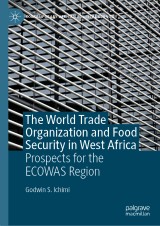Details
The World Trade Organization and Food Security in West Africa
Prospects for the ECOWAS RegionContemporary African Political Economy
|
128,39 € |
|
| Verlag: | Palgrave Macmillan |
| Format: | |
| Veröffentl.: | 25.06.2024 |
| ISBN/EAN: | 9783031538810 |
| Sprache: | englisch |
Dieses eBook enthält ein Wasserzeichen.
Beschreibungen
<p>This book explores the multilateral control of agro-economic spaces in West African developing countries through international trade, spearheaded by the World Trade Organization’s Agreement on Agriculture. Responding to growing food insecurity in the region, Ichimi here examines the web of intricacies in this arrangement by discussing some of the main international trade policies directly and indirectly impacting on food security in West Africa and critically engaging with empirical praxis as well as the theoretical underpinnings vis-a-vis multilateral strategies adopted for the amelioration of the crisis. In so doing, he expose how multilateral trading agreements under the auspices of the World Trade Organization produce negative outcomes for the food security status of a large and growing population in West Africa, privileging primary commodity production and export, maintaining the preference for food imports, and driving the pattern of agricultural investment towards an inexorable dependence of the sector on the dictates of the international market.</p>
<p>.- Chapter 1: Introduction.<br>
.- Chapter 2: Echoing the Debate on Food Security in the West African Region.<br>
.- Chapter 3: Methodological Problems in Food System Research in the West African Region.<br>
.- Chapter 4: Theoretical Linkages and Underpinnings.<br>
.- Chapter 5: The World Trade Organisation and the Global Structuring of the Agrifood System.<br>
.- Chapter 6: The WTO, ECOWAS, and the Prospects for Food Security in West Africa.<br>
.- Chapter 7: Conclusion.</p>
.- Chapter 2: Echoing the Debate on Food Security in the West African Region.<br>
.- Chapter 3: Methodological Problems in Food System Research in the West African Region.<br>
.- Chapter 4: Theoretical Linkages and Underpinnings.<br>
.- Chapter 5: The World Trade Organisation and the Global Structuring of the Agrifood System.<br>
.- Chapter 6: The WTO, ECOWAS, and the Prospects for Food Security in West Africa.<br>
.- Chapter 7: Conclusion.</p>
<p><strong>Godwin S. Ichimi is a Senior Research Fellow </strong>at the Nigeria Institute of International Affairs. He heads the Division of African Politics and Integration as well as the institute’s Center for Ocean Governance and the Blue Economy and Early Warning Systems Center. He holds a PhD in Politics and International Relations from the University of Aberdeen, and his research interests span international political economy with emphasis on international development cooperation as well as human and national security issues.</p>
<p>This book explores the multilateral control of agro-economic spaces in West African developing countries through international trade, spearheaded by the World Trade Organization’s Agreement on Agriculture. Responding to growing food insecurity in the region, Ichimi here examines the web of intricacies in this arrangement by discussing some of the main international trade policies directly and indirectly impacting on food security in West Africa and critically engaging with empirical praxis as well as the theoretical underpinnings vis-a-vis multilateral strategies adopted for the amelioration of the crisis. In so doing, he expose how multilateral trading agreements under the auspices of the World Trade Organization produce negative outcomes for the food security status of a large and growing population in West Africa, privileging primary commodity production and export, maintaining the preference for food imports, and driving the pattern of agricultural investment towards an inexorable dependence of the sector on the dictates of the international market.</p>
<p> </p>
<p><strong>Godwin S. Ichimi is a Senior Research Fellow </strong>at the Nigeria Institute of International Affairs. He heads the Division of African Politics and Integration as well as the institute’s Center for Ocean Governance and the Blue Economy and Early Warning Systems Center. He holds a PhD in Politics and International Relations from the University of Aberdeen, and his research interests span international political economy with emphasis on international development cooperation as well as human and national security issues.</p>
<p> </p>
<p><strong>Godwin S. Ichimi is a Senior Research Fellow </strong>at the Nigeria Institute of International Affairs. He heads the Division of African Politics and Integration as well as the institute’s Center for Ocean Governance and the Blue Economy and Early Warning Systems Center. He holds a PhD in Politics and International Relations from the University of Aberdeen, and his research interests span international political economy with emphasis on international development cooperation as well as human and national security issues.</p>
Analyzes how multilateral trading agreements produce negative outcomes for the region’s food security status Critically engages with empirical praxis as well as theoretical underpinnings of amelioration strategies adopted Explores the multilateral control of the agro-economic space of developing countries of West Africa
Diese Produkte könnten Sie auch interessieren:

Cuba en la política exterior española: la construcción histórica de un consenso estratégico (1989-2004)

von: Raynier Pellón Azopardo

9,99 €

Consejos no solicitados sobre política internacional

von: Juan Gabriel Tokatlian, Hinde Pomeraniec

9,99 €
















